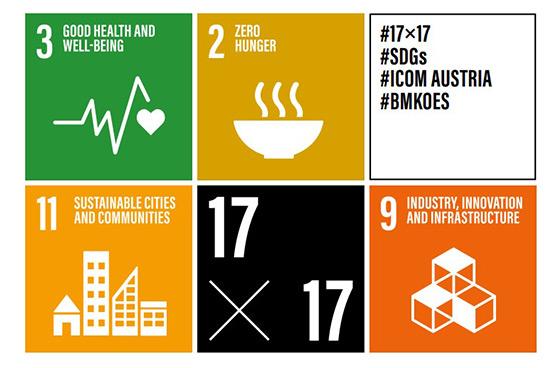
ICOM Austria has recently launched the 17 x 17 project to support concrete actions and share the contribution of museums across the country to the Sustainable Development Goals. The goals were created as a roadmap to the United Nations' Agenda 2030, which envisions a more just and fulfilling life for all through sustainable economic, social and environmental transformations. Museums, as mediums between past, present, people and nature, have the sociopolitical role and responsibility to project this all-encompassing vision of the future. By learning from the past, we can "shape the present so as to ensure a viable world for all humankind in the future."
In this context, the 17 x17 project was designed to address each of the Goals directly with concrete actions. Additionally, the project raised awareness to the Goals within the museums' logistics and collections and externally to their audiences; made the 2030 vision accessible to the international community through culture and art; and strengthened the relationship between museums and other stakeholders by aligning with the SDGs. The project included a range of museums, varying in size, geographical location and collection content so as to demonstrate that regardless of the museums' themes or resources, they can all work together towards the same goals, adapting themselves to their particular circumstances.
The many actions resulting from this project and featured in the manual include: exhibitions on patriachy, ecological and social justice in architecture and democracy and gender equality; making museum spaces available to climate action movements and workshops; fundraising campaigns; creation of written and visual matrials with museum visitors; projection of films on nutrition, sustainable farming and traditional use of medicinal plants; and various internal measures. The Salzbug Open Air Museum Grossgmain, for example, was host to a dinner event on the World Food Day, combining recipes and herbal medicines with musical performances. Focusing on SDG4: Quality Education, they also offered German language courses to school pupils and provided a grant for a Masters student in Cultural and Social Studies to investigate food consumption and waste from the pre-modern era to the present day. The museum also projected short-films on alternative knowledge systems.
Because we live in an interconnected world, the SDGs were outlined to break the 2030 Vision down into clear goals to collectively work towards a sustainable future. Museums are the key stewards to "achieving sustainable progress through cultural, creative and scientific exchange." From this perspective, museums can make impactful changes, not only internally but especially in the messages they convey and how they engage their audiences with these topics. We highly recommend diving into thie manual to see how the SDGs have been brought to life by museums and inspire you and your institution to introduce similar actions.
